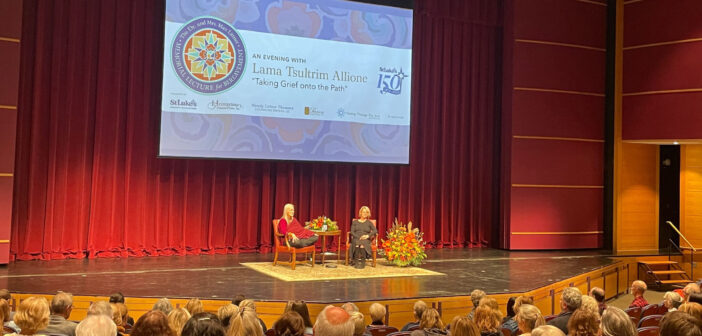Lama Tsultrim Allione, bestselling author, Buddhist teacher and founder of Tara Mandala, shared her life story and conducted exercises with a crowd of Lehigh and Bethlehem community members.
The event took place in Zoellner Arts Center on Oct. 27. This was Allione’s first time delivering these exercises in a lecture format.
The topic of the lecture was grief. It focused on actively grieving, previously having grieved and setting the intention of being there to benefit yourself and all beings.
Allione started by sharing a personal story of losing her child to Sudden Infant Death Syndrome while in Italy in 1981. She said the death was so unpredictable that she did not know how to grieve the worst thing that had happened to her in her life, and often blamed herself.
“Before then, I had never thought anything really bad would happen to me,” Allione said. “I had always heard about these tragedies, but somehow didn’t feel they would happen to me, but then after that, I felt like anything could happen to me. I didn’t feel safe anymore.”
Although Allione had become a Buddhist nun, read various stories and learned different Buddhist traditions, she was unable to find stories of other women in her culture for her to relate to and lean on. In search of female stories in her tradition, Allione went to Nepal.
She returned to the monastery where she had lived as a nun in 1967 in search of women teachers in the Tibetan tradition. She found six stories of various dakinis, otherwise known as wisdom women, and began writing her first book, “Women of Wisdom.”
“All the world’s religions were created by men for men,” Allione said. “I thought, ‘What if they were created by women, for women? What would they be like?’ This opened up a whole world for me to think about and really triggered my writing. Looking at the Tibetan tradition and writing that book helped me recover from the death of my daughter.”
In 1993, Allione and her husband David Petit founded Tara Mandala, a 700-acre Buddhist retreat center in Pagosa Springs, Colorado, which is still open today. According to their website, Tara Mandala is an international community made up of over 40 groups around the world with the goal of weaving the wisdom of Buddhism and Western psychology together.
In 2010, Allione experienced another great loss: the loss of her husband David. She said he died in the middle of the night, completely unexpected, leaving her unable to say goodbye.
After experiencing this loss, she went on a six-month pilgrimage in Tibet. Upon returning to Tara Mandala, she said she stayed for only one night because she couldn’t bear the pain of everything reminding her of what she and her husband built together.
Allione said she felt like she was “failing grief.”
“I said to myself, ‘I’m not being successful at this,’” she said. “I’m a Buddhist teacher, I should be able to deal with this.”
One night, Allione said she was attending an evening practice at Tara Mandala where they sang a song called “Taking Happiness is Happiness Onto the Path.”
She said one lyric in the song stood out to her: “When I’m sad, I’m happy because I can take the sadness of all beings onto myself because I know what sadness is.”
“I thought that was crazy,” Allione said. “I could not possibly take on any more sadness than I have. And then I thought about it and decided to give it a try because nothing else was working. When I began opening myself up to other people’s sadness, it gave me such relief because I got out of the isolation of being alone in this torture chamber of grief.”
During the lecture, Allione asked audience members to raise their hands if they were actively grieving or had previously grieved. Most of the people in the room raised their hands.
In order to help the room of people who came to watch her speak at Zoellner, Allione led a meditation exercise called “Feeding Your Demons.”
Allione asked the crowd to picture feelings of depression, grief and anxiety as demons standing in the room and then watch them dissolve.
Carol Silvoy, an end-of-life doula, someone trained to care for a terminally ill person, was impressed with the meditation process as someone who deals frequently with grief.
“Learning how to lead people through guided meditations is one thing, but going through one like that is so powerful,” Silvoy said. “She has such terrific energy and it’s not an ‘out energy’ but it centered everybody. You could just feel everyone in the room get into the same sort of calmness. She had so much wonderful stuff to share.”
Susan Bianchi, health and wellness coach, said hearing from a female lama was especially powerful.
“It was incredible to be in her presence and it was very moving and touching,” Bianchi said. “Her presence as a lama was such a special moment.”






Comment policy
Comments posted to The Brown and White website are reviewed by a moderator before being approved. Incendiary speech or harassing language, including comments targeted at individuals, may be deemed unacceptable and not published. Spam and other soliciting will also be declined.
The Brown and White also reserves the right to not publish entirely anonymous comments.